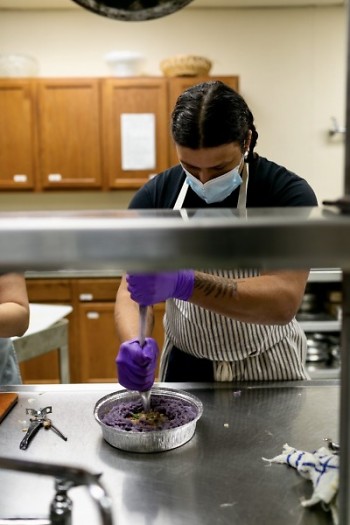As part of our Everybody Eats project, the Kent County Food Policy Council is highlighting food experiences in Kent County. Below is an interview with Camren Stott, an Anishinaabe chef and co-owner of Thirteen Moons Kitchen from Grand Rapids who works to ensure that culturally relevant food is available to Indigenous communities. Camren is also a member of the Kent County Food Policy Council.
Thank you, Camren, for your good food work and sharing your thoughts with us!
Tell me about your relationship with food.
Camren: I’ve always lived on the fence of poverty. Growing up, we had a lot of commodity foods, so I had to get creative with how to make food more flavorful and incorporate different ingredients to make it a well-rounded meal. As a child, my relationship with food was a little rocky but it allowed me to discover my creativity which inspired me to work to change the food system and expand what people have access to.
I’ve been a chef for the past five or six years and something that has always bothered me is accessibility. I have a philosophy that food is medicine; but from my perspective, food is not medicine until it is accessible to all.
In what way do you engage in the local food system?
Camren: I am an Anishinaabe chef and I work with a lot of Indigenous food organizations (like I-Collective and Native American Food Sovereignty Alliance). The aim is to utilize Indigenous food systems to create an atmosphere where culturally relevant food is available to Native Americans. I also do this work in response to the health epidemics that Native communities face.
As part of I-Collective, we advocate for food justice for Indigenous people. We do a lot of work in education – we just put out an online cookbook that uses Indigenous ingredients. We are composed of a lot of different people: chefs, elders, and agriculturalists. We utilize everything under the umbrella of Indigenous food systems from growing food, foraging, and making food utilizing Indigenous ingredients. We believe in land as pedagogy. Everything that we do is for the benefit of educating people on Indigenous food systems so that we can make it accessible to Indigenous people everywhere.
Our job as chefs is to take Indigenous ingredients and create our own cuisine with them: we translate them into a modern context (for example, I make a bison meatloaf). This is how we feed our community. We are not chefs run by ego – it’s more so to utilize and feed our community via restaurants, food pop-ups, and food drives.
If you were to design a food system rooted in equity, justice and sovereignty, where would you focus your attention and why?
Camren: I would definitely focus my attention on majority BIPOC (Black, Indigenous and People of Color) communities. BIPOC communities are underserved in Kent County. My main goal is to ensure that people aren't going hungry. I would refocus on teaching people how to grow their own food and giving them space to do so. There needs to be more community gardens. People shouldn’t have to pay for produce. Because people are working full time jobs and have other commitments or outside factors holding them back, people don’t get the privilege to care about what they are putting in their bodies. The misconception is that lower-income families or people in poverty do not care…they do care, they just don’t have the option to act on it because it is not affordable, and they are more worried about the systemic problems that they are facing. Access to healthy food is a great start in creating a food system rooted in equity and justice.
Interview by: Nicole Kukla
The Rapidian, a program of the 501(c)3 nonprofit Community Media Center, relies on the community’s support to help cover the cost of training reporters and publishing content.
We need your help.
If each of our readers and content creators who values this community platform help support its creation and maintenance, The Rapidian can continue to educate and facilitate a conversation around issues for years to come.
Please support The Rapidian and make a contribution today.
